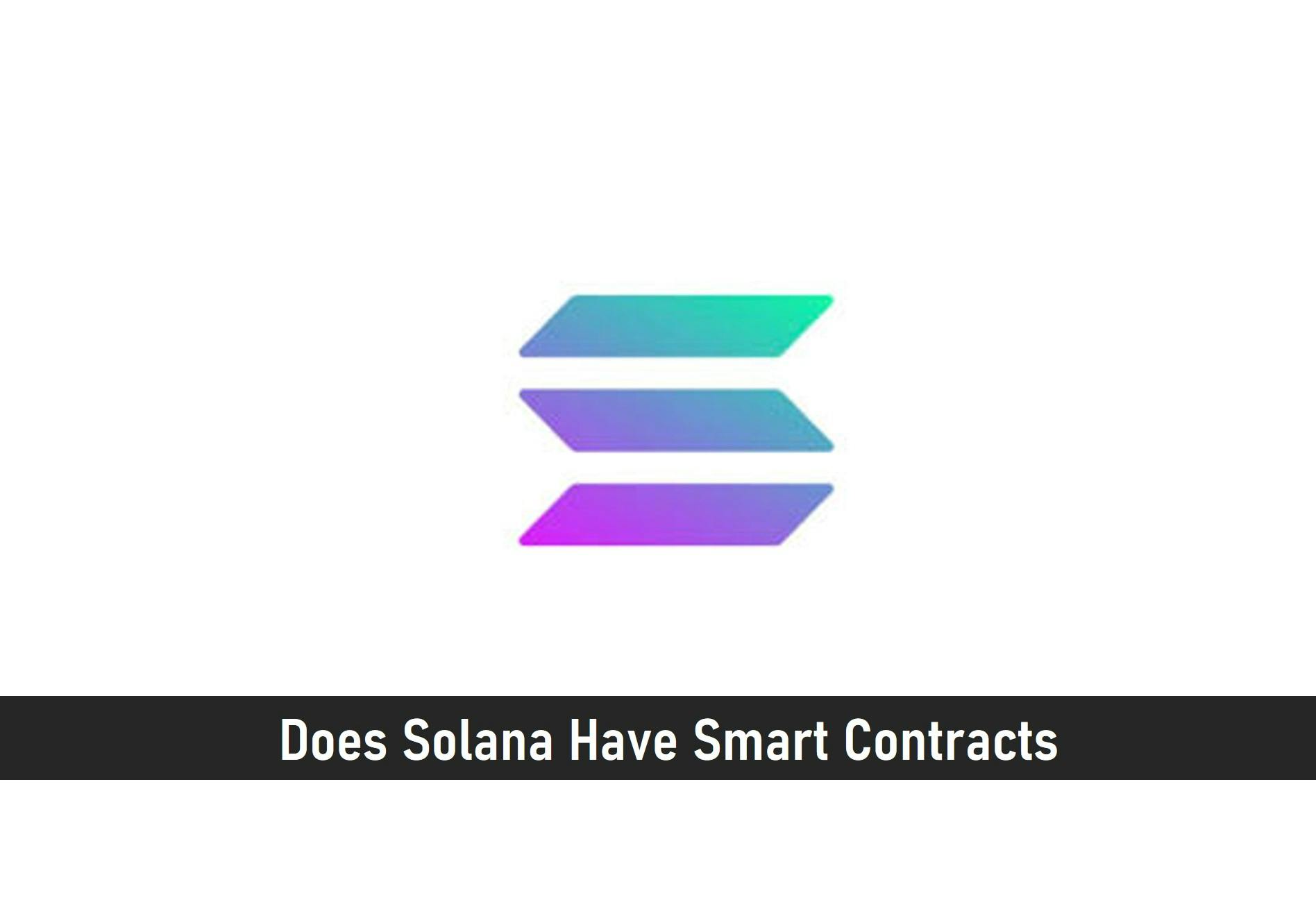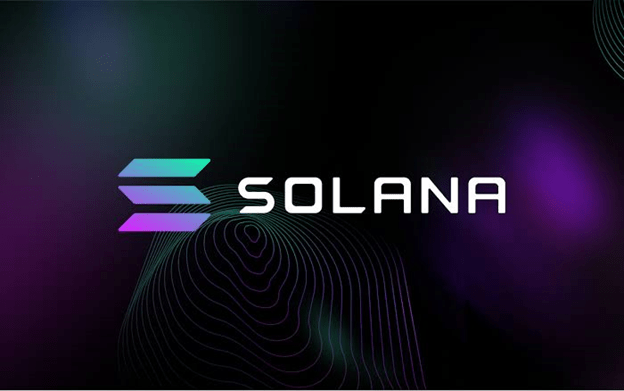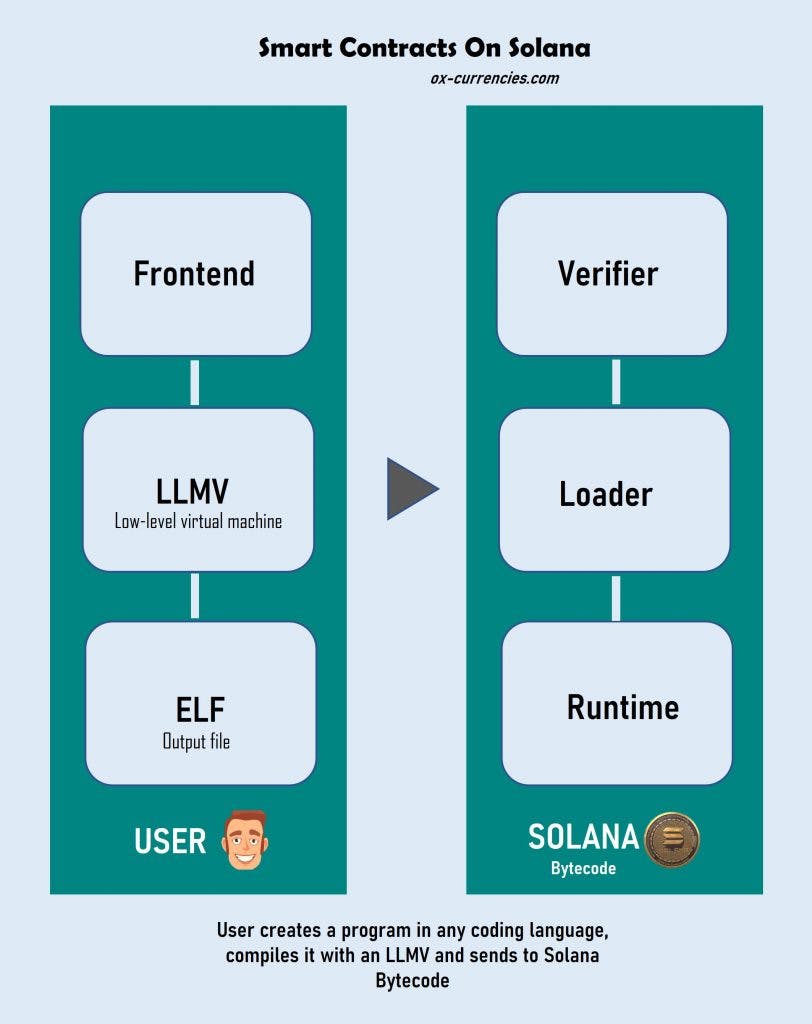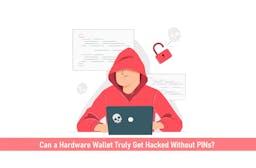
Does Solana have Smart Contracts?
Solana Network works on a proof of history consensus, it is based on how operating systems load and execute dynamic code to smart contract performances.

Key Takeaways
• Bytecode is, it is a program code compiled for a software interpreter from the source code into a low code. The LLVM can be used to execute or compile it into machine code by a virtual machine.
• The proof-of-history (PoH) agreement is likewise utilized by Solana, which implies that information is assembled as one so that there can be verification and documentation of the time of each information.
SEE ALSO: How Much Do Solana Validators Make?
How Does Smart Contracts on Solana Works

From the image above, the user creates a program in which language to code, then compiles it and sends it in the Solana Bytecode with something called LLVM.
LLVM refers to a virtual machine with a low level. It refers also to the LLVM project as a compilation technology and is a collection of modular and reusable technology for compiling and toolchain systems.
An ELF is called the output file. The target is a certain bytecode that is designed to quickly verify and convert the machine’s local instructions (on which Solana is running).
A kernel is an important element of a modern computer system used for initializing and administering critical resources such as CPU and Memory. It offers a platform on which other programs can be run.
SEE ALSO: 7 Best Exchanges that Supports Solana
SEE ALSO: How to Delegate Solana on Ledger with SolFlare
SEE ALSO: What are Solana Validator Node Requirements?
Most of the time the performance of intelligent contracts is focused on WebAssembly, But Solana also stressed the bytecode based on the Berkeley Packet Filter (BPF).
For programs that need to analyze network traffic, BPF is a technology used in operating systems, like smart contract technology.
In short, it provides a data-link interface that enables the transmission and receipt of raw link-layer packets. The reason Solana relies on BPF for its bytecode is that what the kernel does with untrusted code overlaps the requirements that they have which are:
1. A deterministic amount of time to execute code
2. Bytecode that is portable between machine instruction sets
3. Verified memory accesses
4. A short amount of time to load the object and verify the bytecode.
5. The simplest, fastest, and easiest way to verify instruction sets.
If you are wondering what bytecode is, it is a program code compiled for a software interpreter from the source code into a low code. The LLVM can be used to execute or compile it into machine code by a virtual machine.
Memory management is another aspect of importance. Everything begins with the ELF file. Contracts are initially limited to read-only code and data segments: i.e. no mutable globalsor static variables.
This requirement can be relaxed as the Solana Network develops. Since intelligent contracts don’t apply, Solana had a way of managing the contract to develop. They have therefore decided to create a state-building interface; the interface is invoked by a transaction similar to any other contracting method.
Smart contracts have been known to be of immense contribution and that is why it has been prioritized by Solana, Smart contracts are programs put away on the blockchain that runs when foreordained regulations are met and automate agreements so that everyone is guaranteed of the result. They eliminate any inbetweener and speed up the process. This has permitted Solana to exploit the NFT market and DeFi.
Yet other altcoins such as Cardano are additionally intending to enter the smart contract space, so there will probably be expanded rivalry.
SEE ALSO: 6 Best Places to Stake Solana
SEE ALSO: How to Qualify for a Solana Airdrop
The proof-of-history (PoH) agreement is likewise utilized by Solana, which implies that information is assembled as one so that there can be verification and documentation of the time of each information. This idea takes into consideration more noteworthy versatility and trust in the blockchain.
One of the network’s other major guarantees is that its clients won’t be taken unawares with raised charges and expenses. Traders have additionally been conjecturing on a potentially new element Solana was set to dispatch towards the beginning of this month however little is known on what the element could be.
Solana has carried out eight distinctive key technologies that are fundamental to its reality. One of those is called Sealevel, which makes equal smart contracts runtime conceivable. In numerous blockchain networks, each smart contract in turn impacts and adjusts the blockchain state.
Nonetheless, on Solana, the runtime can handle tens of thousands of contracts equally. This takes into account non-overlapping transactions to execute simultaneously, and for transactions that are just perusing a similar state to execute simultaneously too.
Another interesting fact about Solana is the maximum transactions per second (59, 490), the new production of blocks every 400 milliseconds, and the minimal expense per transaction ($0.00001).
A concern, nonetheless, is that even though the Mainnet Beta version has been dispatched, most executions are as yet standing by to be dispatched. This means the network doesn’t perform flawlessly as was made known. This could be corrected with updates later on.
SEE ALSO: Best 10 ERC20 Tokens On the Market
SEE ALSO: How to Become a Profitable Solana Validator
Frequently Asked Questions (FAQ)
1. How does a Smart Contract Work?
A smart contract is an agreement between two people in the form of computer code. They run on the blockchain, so they are stored on a public database and cannot be changed. The transactions that happen in a smart contract are processed by the blockchain, which means they can be sent automatically without a third party.
2. Is Solana faster than Ethereum?
Solana is faster than Ethereum, processing 50,000 transactions per second or more compared to Ethereum’s 15 to 45 TPS rate.
3. Who pays smart contract execution fees?
With every transaction, the client pays the fee, in gas, and this gas will be used to execute called smart contract function. the one who sends the transaction will have to pay the gas cost of executing that particular function in the contract.
Final Thoughts
Solana has been made to be an Ethereum Killer in the sense that it can now perform competitively or even better when compared to other cryptos like Ethereum due to them being built on blockchains.
A smart contract is an integral part of this and is in the plans of Solana creators to bring about improvements in the future.
Read More




